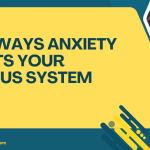Table of Contents
- Introduction
- 1. Mindfulness Meditation
- 2. Regular Exercise
- 3. Healthy Eating
- 4. Quality Sleep
- 5. Social Connections
- Conclusion
- FAQs
Introduction
In today’s fast-paced world, stress can seem like an unavoidable part of life. However, managing stress effectively is crucial for maintaining not just mental well-being but also brain health. Chronic stress can lead to cognitive decline, anxiety, and even depression. Fortunately, there are several techniques you can adopt to help mitigate stress and protect your brain. In this article, we’ll explore five effective stress management techniques that can lead to better brain health.
1. Mindfulness Meditation
Mindfulness meditation is a practice that encourages you to focus on the present moment without judgment. Research has shown that mindfulness can significantly reduce stress and anxiety levels while enhancing cognitive function. A study published in 2024 highlighted its role in reducing symptoms of anxiety and depression among participants.
Benefits:
- Reduces Stress Hormones: Mindfulness meditation has been shown to lower levels of cortisol, the body’s primary stress hormone.
- Enhances Cognitive Flexibility: Regular practice can improve your ability to switch between tasks and think creatively.
How to Get Started:
Begin with just 5 to 10 minutes a day. Find a quiet spot, sit comfortably, and focus on your breath. If your mind wanders, gently bring it back to your breath. You can gradually increase your meditation time as you become more comfortable.
For more information on mindfulness and its benefits, check out Mindful.org and explore Top 5 Ways Caregivers Enhance Neuro Care Effectiveness for insights on how mindfulness can support both caregivers and patients.
2. Regular Exercise
Exercise isn’t just good for your body; it’s essential for your brain health too! Physical activity stimulates the production of neurotrophic factors, which support the growth and survival of neurons. A 2024 study emphasized that even moderate exercise can lead to improvements in cognitive function and stress levels.
Benefits:
- Improves Mood: Exercise releases endorphins, which are natural mood lifters.
- Enhances Memory: Engaging in regular physical activity promotes better memory retention and cognitive function.
Recommended Activities:
- Aerobic exercises: Such as running, swimming, or cycling, can boost brain health.
- Strength training: Lifting weights has also been linked to improved cognitive function.
Quick Exercise Routine:
| Type of Exercise | Duration | Frequency |
|---|---|---|
| Aerobic (Running) | 30 minutes | 3-5 times a week |
| Strength Training | 30 minutes | 2-3 times a week |
| Flexibility (Yoga) | 30 minutes | 1-2 times a week |
For more on the importance of exercise for brain health, visit Harvard Health and read about Top 5 Lifestyle Changes for Better Neuro Health.
3. Healthy Eating
What you eat has a profound effect on your brain health. A balanced diet rich in nutrients can help manage stress and promote cognitive function. In 2024, nutritionists emphasized the impact of specific foods on brain health, linking diets rich in antioxidants and omega-3 fatty acids with reduced stress levels.
Benefits:
- Nutrient-Rich Foods: Foods high in omega-3 fatty acids, antioxidants, and vitamins can help combat stress.
- Stable Blood Sugar: Eating regular, balanced meals can prevent blood sugar spikes that lead to irritability.
Brain-Boosting Foods:
- Fatty Fish: Salmon, sardines, and mackerel are rich in omega-3s.
- Leafy Greens: Spinach and kale are packed with vitamins that support brain health.
- Berries: Blueberries and strawberries are high in antioxidants.
Sample Meal Plan:
| Meal | Food Choices |
|---|---|
| Breakfast | Greek yogurt with berries |
| Lunch | Quinoa salad with leafy greens |
| Snack | Handful of nuts |
| Dinner | Grilled salmon with steamed broccoli |
For more insights on nutrition and brain health, check out The Academy of Nutrition and Dietetics and explore Top 5 Foods to Enhance Your Brain Health Naturally.
4. Quality Sleep
Sleep is essential for brain health, yet many people overlook its importance in stress management. Quality sleep helps to restore cognitive function and emotional well-being. A recent study conducted in 2024 found that individuals who prioritized sleep showed significant improvements in stress management and overall cognitive performance.
Benefits:
- Reduces Stress Levels: Adequate sleep decreases stress levels and enhances mood.
- Improves Cognitive Performance: A good night’s sleep is crucial for memory consolidation.
Tips for Better Sleep:
- Establish a Sleep Routine: Go to bed and wake up at the same time each day.
- Create a Sleep-Friendly Environment: Keep your bedroom dark, cool, and quiet.
- Limit Screen Time: Avoid screens an hour before bed to help your body unwind.
For more information on improving sleep, visit Sleep Foundation and read Top 5 Reasons Sleep Boosts Your Brain Health.
5. Social Connections
Human beings are inherently social creatures, and maintaining strong social connections is vital for managing stress and promoting brain health. In 2024, researchers found that individuals with robust social networks reported lower levels of stress and better mental health outcomes.
Benefits:
- Emotional Support: Friends and family can provide emotional support during stressful times.
- Cognitive Engagement: Social interactions stimulate cognitive processes, keeping your brain active and engaged.
Ways to Foster Connections:
- Join Clubs or Groups: Find local clubs or organizations that align with your interests.
- Volunteer: Helping others can foster a sense of community and reduce stress.
- Schedule Regular Catch-Ups: Make it a point to connect with friends or family regularly.
For more insights on the impact of social connections on mental health, check out Mental Health America and explore Top 5 Ways Family Support Enhances Neuro Recovery.
Conclusion
Managing stress is essential for maintaining brain health. By incorporating mindfulness meditation, regular exercise, healthy eating, quality sleep, and fostering social connections into your daily routine, you can significantly improve your mental well-being and cognitive function. Start with small changes, and remember that every step counts toward a healthier, happier brain!
FAQs
Q: How long does it take to see results from these techniques?
A: Many people notice improvements in their stress levels and mental clarity within a few weeks of consistent practice.
Q: Can I practice these techniques together?
A: Absolutely! In fact, combining these techniques can enhance their benefits and provide a holistic approach to stress management.
Q: What if I have trouble with mindfulness meditation?
A: It’s normal to find meditation challenging at first. Consider using guided meditation apps like Headspace or Calm to help you get started.
By implementing these stress management techniques, you can create a more resilient mind and a healthier brain. Remember, it’s never too late to start taking care of your mental well-being!






